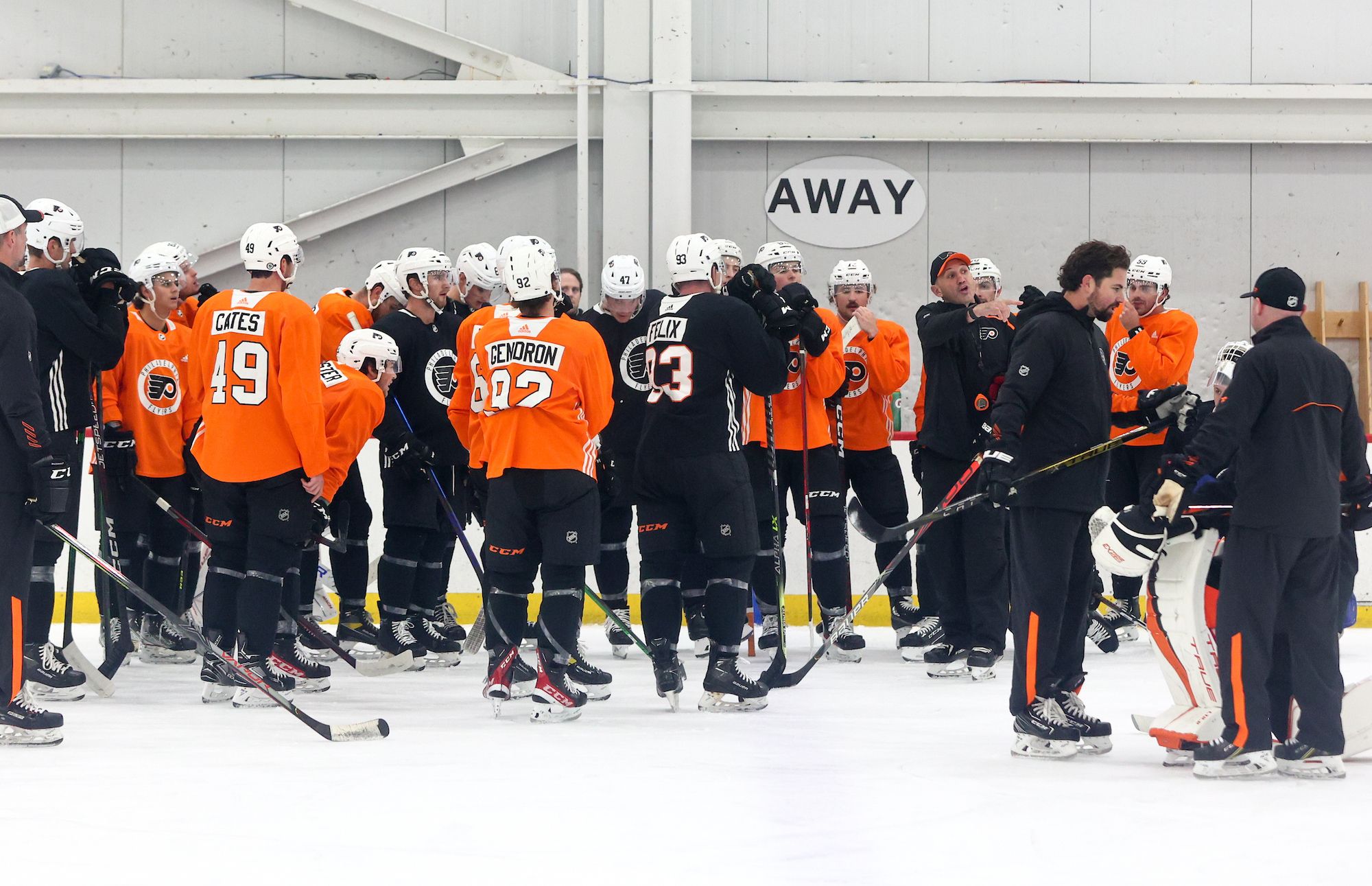Morning Observations is a feature where we break down the previous night’s game with an analytical eye.
- By the end of forty minutes, last night’s game was effectively over. The Flyers were down 3-0 and showing no signs of being able to dent Edmonton goalie Cam Talbot. Still, the first and second periods couldn’t have been more different. The Oilers dominated the Flyers in the opening stanza, cleanly breaking out of their own end and kickstarting rush after rush back up ice. They may have only scored one goal, but Edmonton could have easily been up by at least three. The second period, on the other hand, saw the Flyers find their game, particularly in the offensive zone. Philadelphia’s cycle game was working to perfection, and the Oilers seemed incapable of winning puck battles or accounting for pinching Flyer defensemen. But Philadelphia earned no reward for all of their pressure. Instead, the Oilers somehow found a way to score twice in the period, despite generating only 12 shot attempts during the twenty minutes. Even when the Flyers were playing well, they couldn’t get the results to match.
- The Flyers have played Edmonton twice this season, and in both games, the Oilers got the better of play. Edmonton is undoubtedly one of the worst teams in the NHL, true threats to win yet another draft lottery this summer. So why has Philadelphia been unable to match this opponent in 2015-16? We’re dealing with a small sample, but I think it’s fair to wonder if the Flyers simply do not match up well with the Oilers, considering the way that the two teams are currently constructed. Edmonton is a team built around speed up front, which makes them a nightmare to deal with in transition. The Flyers’ system is built around two hallmarks – a punishing forecheck and aggressive neutral zone tactics. But the Oilers have the speed and talent up front to blow right past challenging defensemen in the middle of the ice, decreasing the effectiveness of the latter tactic. That leaves the forecheck as the only way for the Flyers to take control of games against Edmonton. In the second period last night, the forecheck was firing on all cylinders, so the Flyers were able to exploit the Oilers’ weak blueliners. But when it failed, Edmonton was able to control the tempo of the game entirely./
NHL.com Report and Highlights | War-On-Ice.com Report | HockeyStats.ca Report | ExpectedGoals (xG) | HockeyViz.com | BSH Recap | Meltzer’s Musings
- The first period saw the Flyers play uninspired hockey, while in the second period they carried play only to be sunk by two high-quality chances by Edmonton. In the final stanza, however, Philadelphia simply looked like a defeated team. Despite being down three goals, the Flyers did not see the score effects boost that trailing teams often get when down by large margins. Instead, they could only muster two high-danger scoring chances at even strength, as the Oilers focused on keeping the Flyers to the outside. Philadelphia had one final chance at turning the tide of the game after Zack Kassian took an ill-advised double-minor for high-sticking. But the Flyers responded with their worst power play of the game, and even allowed a shorthanded goal. I’m sure the team was demoralized after carrying play in the second period only to lose even more ground on the scoreboard, but you’d like to see a higher compete level in the game’s final twenty minutes regardless.
- Despite their mediocre performance (47.4% score-adjusted Corsi), the Flyers still could have won this game with just a little bit of puck luck. They hit three posts in the first two periods of play – two by defensemen (Gostisbehere and Streit) on the power play, and one via a rush chance by Pierre-Edouard Bellemare. Even when they got the puck on net, it seemed like golden opportunities were being directed right into the stationary pads of Cam Talbot. Philadelphia was not the better team last night by almost every statistical metric, so it’s difficult to get too frustrated with the hockey gods. Still, the Flyers were both bad and unlucky last night. That’s how you get a 4-0 spanking.
- The performance of Cam Talbot was yet another reason for the Flyers’ defeat. While Philadelphia was mostly toothless at even strength, they did generate a ridiculous amount of shots and chances on their numerous power play opportunities. In a little over 14 minutes of time with the man advantage, the Flyers threw 15 shots on goal and generated eight high-danger scoring chances. Each time, Talbot found a way to deny the Philadelphia shooters. Sure, he received some help from the goalposts and a distinct lack of accuracy on the part of the Flyers. But this was Talbot’s fifth straight game with a save percentage over 0.940, so he’s clearly locked in at the moment. He certainly made life very difficult for Philadelphia forwards last night.
- Shayne Gostisbehere had quite an odd game. In the first period, he was the best Flyers skater by far, making three separate fantastic plays in the defensive zone to break up Edmonton attacks. He even drew a penalty late in the period and then rang a shot off the post during the ensuing power play. His stellar start to the game made his later struggles all the more perplexing. During the final forty minutes of the contest, Gostisbehere was more mistake-prone than he has been all season, and his turnovers directly led to two Oilers goals. We’ve talked about Dave Hakstol granting Gostisbehere a long leash, permitting him to take risks due to the belief that the good will ultimately outweigh the bad in terms of results. But before last night, few of Ghost’s mistakes actually led to any goals against. His performance last night will be the first real test of Hakstol’s resolve, as it would be very easy for the coach to watch tape of this game and come away very frustrated with his young defenseman.
- Sean Couturier received 11:59 of 5-on-5 ice time in this game, and he spent 8:53 of that time facing off against Connor McDavid and his linemates. Unfortunately for the Flyers’ shutdown center, Couturier and his line was unable to stymie the phenom. Against McDavid, Couturier posted a poor 38.89% Corsi For percentage, which was the main reason for his underwhelming overall performance. The 23-year old has been Philadelphia’s best puck possession player this season, but not even he could slow McDavid, who is already looking like one of the best forwards in the NHL.
- Desperate to create tangible offense for his club, Dave Hakstol essentially flipped the centermen of the second and third lines midway through the contest. Couturier was given Matt Read and Scott Laughton as linemates, while Nick Cousins centered Michael Raffl and Sam Gagner. Cousins was actually the team’s most effective possession forward in this one, finishing with a 76.92% Corsi For percentage. Regardless of his wingers, Cousins’ line was particularly effective on the forecheck, helping to pin the Oilers deep in their own zone for shifts at a time. It will be interesting to see if the line shuffling will hold for Saturday’s game against the Columbus Blue Jackets.
- Yesterday, I advocated for an increase in Evgeny Medvedev’s role on the blueline, arguing that his ability to drive play at a high level outweighs any concerns regarding his defensive play. Just hours later, Medvedev goes out and has the most Evgeny Medvedev game possible. His poor positioning and reaction on Connor McDavid’s first period rush directly led to Nail Yakupov’s early goal, and for many, that play will be all they remember about the Russian blueliner’s performance. However, Medvedev also posted a strong 60.61% Corsi For percentage, second-best among Flyers defensemen. He clearly was able to shake off his mistake and push the play in the right direction during the remainder of the contest. But that still doesn’t erase his big mistake. In many ways, Medvedev is starting to reminder me of Matt Carle, in that his errors seem to be particularly glaring, and usually end with the puck in the back of the net. But like Carle, Medvedev’s overall play is a net positive to the team. Carle always had the trust of his coaching staff, however, so it was only the fans that railed at him for his “big mistakes.” Medvedev, on the other hand, is regularly punished for them.
- While it wasn’t nearly as impressive as his dominant performance from Tuesday, Brayden Schenn was yet again trigger-happy with his shots. Clearly operating with newfound confidence, Schenn finished with three high-danger scoring chances and took nine shot attempts at Cam Talbot. I noted on Wednesday that Schenn’s scoring surge was not attributable to an increase in the number of shots taken, but this is the second straight game that saw Schenn fire away. Combine his rapidly-improving possession statistics with an increased willingness to shoot the puck, and it’s possible that Schenn could take yet another step forward in the coming weeks.









